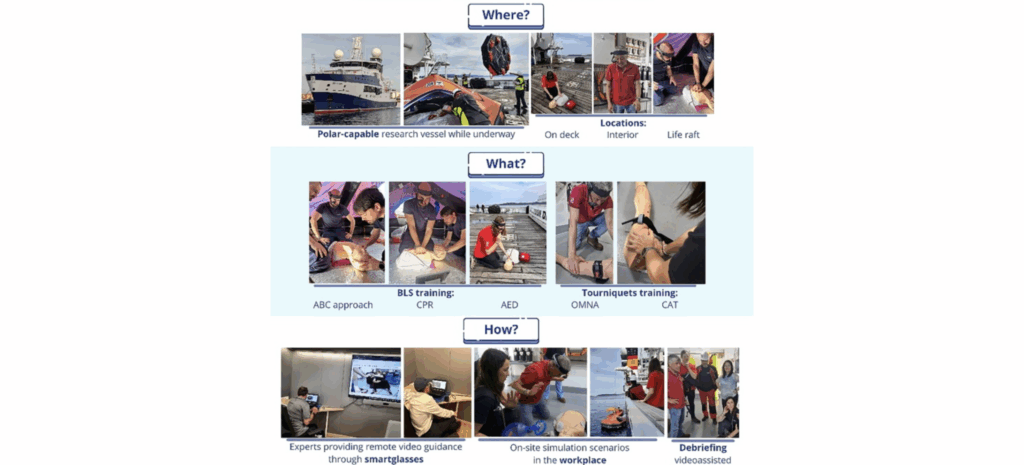Pivotal industry and engineering research confirms the irreversible shift towards digitized, knowledge-intensive field services. This validation highlights that traditional, slow on-site support models are rapidly being replaced by technologies that leverage real-time visual collaboration and Augmented Reality (AR).
The core finding is that AR-powered remote assistance solutions are not merely a communication tool, but a foundational technology for operational efficiency and institutional knowledge transfer.
Training at Sea, Guided from Shore: How Smart Glasses Transform Emergency Drills
The crew of the CSIC research vessel, Odón de Buen, recently completed high-stakes emergency simulations using innovative remote assistance technology. Participants wore RealWear® smart glasses linked to the Remote eye® platform via Starlink satellite, allowing a remote instructor to guide them instantly. The instructor saw the scene live, providing immediate coaching on critical procedures like Basic Life Support (BLS) and serious hemorrhage control.
Crucially, these drills were seamlessly woven into daily life on the ship—from maintenance work to a realistic shipwreck evacuation into a life raft. This proved that expert guidance can be delivered anywhere, anytime, under the most challenging conditions. After each intense simulation, the remote expert led a vital debriefing session, using the technology to promote critical team reflection and highlight key learning points.
Key takeaways from the research:
- Significant Cost Reduction: Elimination of expert travel and quicker resolution times lead to substantial cuts in operational expenses.
- Improved First-Time Fix Rates (FTFR): Real-time, contextual guidance (like AR annotations) drastically increases the probability of resolving complex issues during the first visit.
- Bridging the Skills Gap: The platform instantly transfers hands-on knowledge from senior experts to junior technicians, effectively digitizing years of experience.
- Enhanced Operational Reliability: Immediate support minimizes equipment downtime, directly contributing to higher production uptime and overall efficiency.
The world of industrial service is no longer defined by slow, costly site visits. It’s defined by the speed of data and the clarity of visual collaboration.
Groundbreaking research from the world of Advanced Engineering Informatics confirms what Wideum’s B2B clients already know: Augmented Reality Remote Assistance is the proven path to operational excellence.
This industry validation underscores the power of our Wideum Remote Eye solution. The core challenge in modern field service is simple: getting the right expert knowledge to the right place, instantly. By integrating AR and smart glasses into our platform, Wideum doesn’t just enable a video call—we facilitate a real-time, hands-free transfer of knowledge that transforms your operations.
Why Wideum is Ahead of the Curve:
- Maximize ROI: The research validates the massive cost savings from slashing travel expenses and minimizing downtime. With Wideum, these savings are tangible and immediate.
- Empowering the Connected Worker: Our focus on multi-platform compatibility (including smart glasses for true hands-free work) ensures that your technicians can leverage the full power of AR guidance, leading to the higher First-Time Fix Rates the studies recommend.
- Securing Institutional Knowledge: We turn expert guidance sessions into valuable, traceable digital assets, aligning perfectly with the research’s call for better knowledge retention and training methodologies.
The message from leading industry studies is clear: Digital transformation in maintenance and field service is mandatory for competitiveness. Wideum is the strategic partner that turns this research into your competitive advantage.
Credit authorship contribution statement
Silvia Aranda-García: Conceptualization, Investigation, Methodology, Supervision, Writing – original draft, Writing – review & editing.
Roberto Barcala-Furelos: Conceptualization, Investigation, Methodology, Writing – review & editing.
Jordi Sorribas: Investigation, Resources, Supervision, Writing – review & editing.
Roberto González: Investigation, Resources, Supervision, Writing – review & editing.
Marc Darné: Methodology, Visualization, Writing – review & editing.
Antonio Rodriguez-Núñez: Conceptualization, Investigation, Methodology, Writing – original draft, Writing – review & editing.
More information about the study: https://www.sciencedirect.com/science/article/pii/S2666520425001869?via%3Dihub

